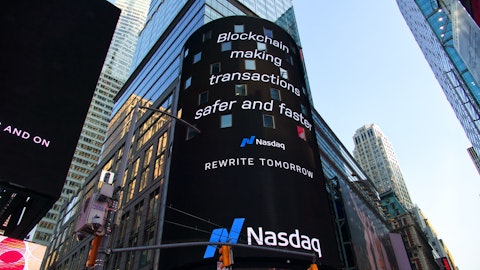In this article, we will look at the 7 Undervalued European Stocks To Invest In Now.
Europe’s Economic Outlook
According to the European Commission’s Economic Outlook, the European economy staged a comeback at the start of 2024, following a prolonged period of stagnation. The growth rate of 0.3%, estimated for the first quarter of 2024, was still below potential but exceeded expectations. The EU economy is expected to grow by 1.0% in 2024 and 1.6% in 2025, while the euro area is expected to grow by 0.8% in 2024 and 1.4% in 2025.
Inflation across the EU cooled further in the first quarter, with inflation projected to decrease from 6.4% in 2023 to 2.7% in 2024 and 2.2% in 2025. The European Central Bank is expected to cut interest rates, with markets expecting a more gradual pace of policy rate cuts than previously expected. Private consumption is expected to expand by 1.3% in 2024 and 1.7% in 2025, driven by continued wage and employment growth. Investment is expected to expand marginally in 2024 before accelerating in 2025, driven by government infrastructure spending and a gradual expansion of investment activity.
The EU’s external demand is expected to rebound, driven by a strong rebound in China’s economic activity and a recovery in global merchandise trade. EU exports of goods and services are expected to expand by 1.4% this year and 3.1% in 2025. The EU government deficit is projected to resume declining in 2024 and 2025, driven by the phase-out of energy-related measures and a gradual improvement in economic activity. The EU fiscal stance is set to be contractionary in 2024 and broadly neutral in 2025.
The Europe’s Market is Undervalued and Overlooked
Nicholas Hyett, investment manager at the Wealth Club, one of the leading investment services companies in the United Kingdom, is optimistic about the European economy, particularly the UK, going into 2024. He notes that the UK market is undervalued, trading 40% below the US, and believes there are growth opportunities in sectors such as consumer goods and industrials. Despite the UK market being perceived as old-fashioned, Hyett argues that it is more dynamic than it appears, with many companies being much cheaper than their US counterparts.
Hyett acknowledges that the UK market is often associated with traditional industries such as oil and gas and mining, which have had a good run in recent years. However, he believes that many other sectors are poised for growth, such as consumer goods and industrials. These sectors have been overlooked by investors in recent years, but Hyett believes that they have the potential to perform well in a strong 2024.
One of the main concerns for investors in 2024 is election uncertainty. The US presidential election is expected to be a major event, and elections are scheduled in Europe. However, Hyett believes that the uncertainty surrounding these elections is already priced into the market. He notes that the UK and European elections are likely to be less of a concern than the US election and that the market is already reflecting this.
In terms of interest rates, Hyett expects that they will be cut in the second half of 2024 and believes that this is a reasonable expectation. However, he notes that the timing and extent of the rate cuts will depend on the economic outlook. If the economy weakens, rate cuts are likely to be more aggressive. On the other hand, if the economy is stronger than expected, then rate cuts may be more gradual. Hyett notes that inflation is expected to drop significantly in 2024, which could lead to rate cuts. However, he also notes that the market is already pricing in a significant drop in inflation and that the timing and extent of the rate cuts will depend on the actual inflation data.
The European economy is poised for a modest recovery in 2024 and 2025, driven by a combination of factors, including a rebound in private consumption, investment, and external demand. While growth rates are expected to remain below potential, the European Commission’s Economic Outlook suggests that the EU economy is on track to return after prolonged stagnation. With that in context, let’s take a look at the 7 undervalued European stocks to invest in now.

Our Methodology
To compile our list of 7 undervalued European stocks to invest in now, we used the Finviz and Yahoo stock screeners to find 40 largest European companies. From that list, we screened for companies that are trading at a forward P/E ratio of under 15, as of September 26. We then narrowed our choices to 7 stocks according to their hedge fund sentiment, which was taken from our database of 912 elite hedge funds as of Q2 of 2024. The list is sorted in ascending order of their hedge fund sentiment, as of the second quarter.
Why do we care about what hedge funds do? The reason is simple: our research has shown that we can outperform the market by imitating the top stock picks of the best hedge funds. Our quarterly newsletter’s strategy selects 14 small-cap and large-cap stocks every quarter and has returned 275% since May 2014, beating its benchmark by 150 percentage points (see more details here).
7 Undervalued European Stocks To Invest In Now
7. BP (NYSE:BP)
Number of Hedge Fund Investors: 38
Forward P/E Ratio as of September 26: 8.16
BP (NYSE:BP) is a multinational energy company with a diverse portfolio of businesses, including exploration, refining, marketing, and production of oil and natural gas products. The company also has a significant presence in solar energy and is a leading manufacturer of terephthalic acid, a key component in producing plastic bottles, food containers, and textiles. The company’s brand portfolio includes well-known names such as BP, Aral, Castrol, and Air BP, which cater to various energy and chemical sectors, including fuel and lubricants, automotive and industrial lubricants, and electric vehicle charging.
BP (NYSE:BP) has committed to reducing its oil and gas production by 25% by 2030 and is investing heavily in lower-carbon initiatives. On September 12, BP (NYSE:BP) and Iberdrola, a Spanish multinational electric utility company, announced the construction of a 25 MW green hydrogen project at BP’s (NYSE:BP) Castellon refinery in Spain, which is expected to be operational in the second half of 2026. This project is the first joint hydrogen venture between BP (NYSE:BP) and Iberdrola through their equally owned joint venture, Castellon Green Hydrogen. The project has received funding of $16.73 million from the Spanish Recovery, Transformation, and Resilience Plan. The initiative, which also involves the Technology Institute of Energy (ITE), aims to produce green hydrogen, a cleaner and more sustainable alternative to traditional fossil fuels, and marks an important step forward in the companies’ efforts to reduce their carbon footprint and contribute to a more sustainable energy future.
BP’s (NYSE:BP) commitment to reducing its oil and gas production and investing in lower-carbon initiatives, such as the 25 MW green hydrogen project with Iberdrola, positions the company for long-term success and growth. With a strong track record of innovation and a commitment to sustainability, BP (NYSE:BP) is poised to thrive in a rapidly changing energy landscape. BP (NYSE:BP) is trading at a forward P/E ratio of 8.16 which is a 29.84% discount compared to the industry average of 11.63. Analysts have given the stock a Buy rating with an average price target of $41.29, which implies an upside of 26.33% from current levels. As of the second quarter, the stock is held by 38 hedge funds with stakes worth $1.48 billion. Fisher Asset Management is the largest stakeholder in the company and has a position worth $787.49 million as of June 30.
6. Aptiv (NYSE:APTV)
Number of Hedge Fund Investors: 38
Forward P/E Ratio as of September 26: 11.52
Aptiv (NYSE:APTV) is a leading global technology company that provides solutions to various industries, including transportation, aerospace and defense, telecommunications, and industrial markets. The company delivers world-class products, platforms, and full-system solutions through its various brands, including Aptiv, Wind River, HellermannTyton, Intercable Automotive Solutions, and Winchester Interconnect. Aptiv (NYSE:APTV) is known for its innovations in autonomous driving and electric vehicle architectures. The company’s products help reduce the complexity of vehicle systems, improving vehicle safety and efficiency.
On August 13, Aptiv (NYSE:APTV) celebrated the expansion of its manufacturing facility in Chennai, India. The expanded plant, which will produce cutting-edge cockpit control systems, will increase the company’s production capacity and enable it to supply high-quality components to key automakers in India and global markets.
The expansion is expected to solidify Aptiv’s (NYSE:APTV) position as a key automotive partner in India and drive innovation in one of the world’s fastest-growing markets. With the expanded plant, Aptiv (NYSE:APTV) will be able to produce advanced safety and user experience features, such as radars, cameras, and next-generation electronic control units, which will help the company to stay ahead of the competition and meet the growing demand for software-defined vehicles.
Aptiv (NYSE:APTV) is trading 11.52 times its earnings, which is a 31.60% discount compared to the sector median of 16.84. The company’s earnings are expected to grow by 24.86% this year. The stock was held by 38 hedge funds at the end of the second quarter with stakes worth $1.02 billion. As of June 30, Impax Asset Management is the largest shareholder in the company, with a stake worth $437.86 million. Analysts hold a consensus Buy rating on the stock, and the average price target of $91.34 implies an upside of 25.67%.
5. LyondellBasell (NYSE:LYB)
Number of Hedge Fund Investors: 41
Forward P/E Ratio as of September 26: 12.25
LyondellBasell (NYSE:LYB) is a multinational chemical company based in the United Kingdom. It is one of the world’s largest plastics, chemicals, and refining companies. The company is a leader in polymer production and is advancing its sustainability efforts, focusing on recycling and reducing its carbon footprint.
On September 19, LyondellBasell (NYSE:LYB) announced its first industrial-scale advanced recycling plant at its Wesseling, Germany site. The plant will utilize the company’s proprietary MoReTec technology to recycle hard-to-recycle plastics into raw materials that can be used to produce new plastic polymers. With the ability to operate under 100% renewable power, the plant is expected to reduce greenhouse gas emissions.
Furthermore, on August 22, LyondellBasell (NYSE:LYB) announced that it had entered into an agreement to acquire full ownership of APK, a recycling technology company based in Merseburg, Germany. The acquisition is expected to expand LyondellBasel’sl (NYSE:LYB) technology portfolio and strengthen its Circular and Low Carbon Solutions business, which is focused on developing innovative recycling technologies. The transaction includes existing assets and planned growth projects. It aims to upgrade LyondellBasell’s (NYSE:LYB) Circular and Low Carbon Solutions business and further diversify its portfolio of innovative recycling technologies.
LyondellBasell’s (NYSE:LYB) revenue is derived from two major business segments, Olefins & Polyolefins and Intermediates & Derivatives. The company’s management is planning to exit the refining business by next year, is committed to focus on the international Olefins & Polyolefins segment and is optimistic about demand in Europe.
LyondellBasell (NYSE:LYB) is among the highly attractive options for investors seeking a stable and growing dividend income; with a current dividend yield of 5.6% and a favorable outlook for long-term dividend growth, LyondellBasell (NYSE:LYB) a good fit for long-term investors and income-focused investors.
LyondellBasell (NYSE:LYB) is trading at a forward P/E ratio of 12.25 which is a 26.48% discount compared to the industry average of 16.66. Analysts have given the stock a Buy rating with an average price target of $104.45, which implies an upside of 9.6% from current levels. As of the second quarter, the stock is held by 41 hedge funds with stakes worth $630.03 million. Millennium Management is the largest stakeholder in the company and has a position worth $127.17 million as of June 30.
4. Chubb (NYSE:CB)
Number of Hedge Fund Investors: 46
Forward P/E Ratio as of September 26: 11.92
Chubb (NYSE:CB) is a Swiss-based global insurance company that offers comprehensive coverage solutions for commercial and personal property, casualty, and accident insurance. The company operates in 54 countries and territories.
The property & casualty insurance industry is expected to have good momentum going forward, especially in personal lines. BeInsure expects property & casualty personal lines to grow 8% in 2024 and 5% in 2025. The industry’s net combined ratio is expected to decline well into 98.5% in 2024 and 2025 compared to 102% ratio in 2023. As a result, the industry’s return on equity is expected to rise from 3.4% in 2023 to 9.5% in 2024 and further to 10.0% in 2025.
In Q2, Chubb’s (NYSE:CB) reported a solid growth in written premiums, with a 10.3% increase in net property & casualty premiums written and a 24.5% growth in life insurance net written premiums. The company’s combined ratio remained stable, and its core operating income per share increased 9.3% year-on-year. Investment income also increased, and Chubb’s (NYSE:CB) EPS of $5.46 grew 26.4% year-on-year, beating expectations by $0.30.
Chubb’s (NYSE:CB) stock remains attractively priced. The company’s good momentum in written premiums and solid earnings, combined with the industry’s low overall risk level, make the stock a good investment opportunity. Chubb (NYSE:CB) is trading at a forward P/E ratio of 13.44 which is a 12.78% discount compared to the industry average of 11.92. Analysts expect the company to increase its earnings by 8.51% this year. As of the second quarter, the stock is held by 49 hedge funds with stakes worth $8.06 billion. Berkshire Hathaway is the largest stakeholder in the company and has a position worth $6.89 billion as of June 30.
3. Shell (NYSE:SHEL)
Number of Hedge Fund Investors: 49
Forward P/E Ratio as of September 26: 8.47
Shell (NYSE:SHEL) is a British multinational oil and gas company and one of the largest energy companies in the world. The company is involved in every aspect oil and gas business. Shell is transitioning towards cleaner energy sources, investing heavily in renewable energy and electric vehicle infrastructure. Recently, Shell (NYSE:SHEL) has undergone significant changes; the company has paused less profitable biofuel projects and is focusing on hydrocarbons, including investing in oil and gas developments and LNG terminals.
On August 12, Shell (NYSE:SHEL) announced to invest in the development of Phase 2 of the Surat Gas Project in Australia, through its incorporated joint venture, Arrow Energy. As a 50% joint venture partner with PetroChina. Phase 2 is expected to contribute around 22,400 barrels of oil equivalent per day at peak production. The project will supply gas to the Shell-operated QCLNG liquefied natural gas (LNG) facility to meet long-term contracts and supply domestic customers.
The project will develop 450 production wells, a field compression station, 27 kilometers of new pipeline, and road and infrastructure upgrades. The first gas is expected in 2026. By investing in Phase 2 of the Surat Gas Project, Shell (NYSE:SHEL) aims to sustain and grow its secure energy source by offering a lower-emissions alternative to options like coal.
The company’s focus on investing in oil and gas developments and LNG terminals is expected to drive growth in the company’s production. The company’s total production across segments is expected to grow by an additional 250Mboe/d through 2025, driven by the online of additional gas fields and offshore rigs in the Gulf of Mexico and Brazil.
Shell (NYSE:SHEL) is trading 8.47 times its earnings, which is a 27.16% discount compared to the sector median of 11.63. The stock was held by 49 hedge funds at the end of the second quarter with stakes worth $6,05 billion. As of June 30, Fisher Asset Management is the largest shareholder in the company, with a stake worth $1.73 billion. Analysts hold a consensus Buy rating on the stock, and the average price target of $83.30 implies an upside of 20.19%.
2. AerCap (NYSE:AER)
Number of Hedge Fund Investors: 64
Forward P/E Ratio as of September 26: 8.68
AerCap (NYSE:AER) is one of the world’s largest aircraft leasing companies. The company provides aircraft leasing and aviation finance services to airlines worldwide. AerCap’s (NYSE:AER) fleet includes over 1,300 aircraft. The company is focusing on expanding its global presence and modernizing its fleet to include more fuel-efficient models.
On August 1, AerCap (NYSE:AER) announced the delivery of the first three Airbus A321neo aircraft to AirAsia Group, a low-cost airline headquartered near Malaysia. The aircraft are part of a 15-unit deal, with the remaining 12 units scheduled for delivery in 2024 and 2025. With the delivery of the aircraft, AerCap (NYSE:AER) will generate revenue through long-term lease agreements with AirAsia, which will provide a stable source of income. The deal strengthens AerCap’s (NYSE:AER) presence in the Asia-Pacific market and may lead to future growth opportunities, such as additional aircraft deliveries or other business collaborations.
AerCap (NYSE:AER) is trading 8.68 times its earnings, which is a 56.88% discount compared to the sector median of 20.13. The company’s earnings are expected to grow by 4.73% this year. The stock was held by 64 hedge funds at the end of the second quarter with stakes worth $4 billion. As of June 30, Eagle Capital Management is the largest shareholder in the company, with a stake worth $1.12 billion. Analysts hold a consensus Buy rating on the stock, and the average price target of $106.88 implies an upside of 11.43%.
1. CRH (NYSE:CRH)
Number of Hedge Fund Investors: 75
Forward P/E Ratio as of September 26: 11.93
CRH (NYSE:CRH) is an international company based in Ireland that manufactures and supplies a wide range of building materials. The company’s diversified business model, strategic acquisitions, and favorable market trends position it for continued success in the construction materials industry. CRH (NYSE:CRH) operates in 31 countries and has a strong presence in the Americas and Europe. The company is a leader in sustainable construction solutions and has committed to significantly reducing its carbon emissions by 2030.
On July 1, 2024, CRH (NYSE:CRH) completed its acquisition of a 57% stake in Adbri, an Australian manufacturer of cement, lime, and dry blended products. By doing so, CRH (NYSE:CRH) has positioned itself to fully integrate Adbri’s operations, unlocking potential cost synergies and paving the way for improved operational efficiency. Moreover, CRH (NYSE:CRH) is expected to strengthen its market position and generate cost savings, with estimated cost savings of $60 million by the third year.
The Infrastructure Investment and Jobs Act (IIJA), with a total allocation of $1.2 trillion, is poised to significantly enhance the infrastructure sector, particularly benefiting companies such as CRH (NYSE:CRH). A notable portion of this funding, approximately $110 billion, is earmarked for critical areas such as roads and bridges, as well as essential utility infrastructure, which includes water, energy, and technology systems.
CRH’s (NYSE:CRH) strong historical financial performance, strategic acquisitions, and favorable market trends position the company for continued growth and success in the construction materials industry. CRH’s (NYSE:CRH) stock is trading at a forward P/E ratio of 16.71. Analysts expect the company to increase its earnings by 24.16% this year and have given the stock a Buy rating with an average price target of $102.58, which implies an upside of 11.43% from current levels. As of the second quarter, the stock is held by 75 hedge funds with stakes worth $6.3 billion. Select Equity Group is the largest stakeholder in the company and has a position worth $1.09 billion as of June 30.
While we acknowledge the potential of CRH (NYSE:CRH) to grow, our conviction lies in the belief that AI stocks hold greater promise for delivering higher returns and doing so within a shorter timeframe. If you are looking for an AI stock that is more promising than CRH but that trades at less than 5 times its earnings, check out our report about the cheapest AI stock.
READ NEXT: $30 Trillion Opportunity: 15 Best Humanoid Robot Stocks to Buy According to Morgan Stanley and Jim Cramer Says NVIDIA ‘Has Become A Wasteland’.
Disclosure. None. Insider Monkey focuses on uncovering the best investment ideas of hedge funds and investors. Please subscribe to our daily free newsletter to get the latest investment ideas from hedge funds’ investor letters by entering your email address below.





